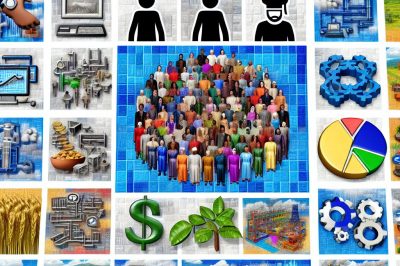Understanding Economic Growth
To improve an economy, it is crucial to understand the fundamental drivers of economic growth. Economic growth is typically defined by an increase in a country’s production of goods and services. This growth is measured by the Gross Domestic Product (GDP), which indicates how an economy is expanding over time. Several elements are vital for fostering economic growth, each playing a unique role in supporting an expanding economy. For those interested in exploring more about economic growth and development, the InfoShop offers valuable resources.
Fostering Innovation
Innovation serves as a catalytic driver of economic evolution and expansion. By embracing the development of new technologies and enhancing existing solutions, societies can significantly increase productivity and efficiency. This innovation ecosystem can be nurtured by governments and businesses through various mechanisms. Among these, investment in research and development (R&D), offering incentives for new inventions, and ensuring robust protection of intellectual property rights via patents are crucial.
To further elaborate, investment in R&D not only generates new ideas but also improves technological adaptation within an economy. Governments can also provide tax credits or subsidies to companies investing in innovative processes or products. In tandem, protecting intellectual property through patents incentivizes individuals and corporations to pursue groundbreaking inventions, knowing their ideas are safeguarded against unauthorized use.
Investing in Infrastructure
Infrastructure investment is paramount to facilitating trade and commerce, serving as a backbone for economic activities. A well-developed infrastructure network significantly reduces transaction costs and enhances production efficiency. This includes improving transportation networks, refining communication systems, and expanding the energy supply.
Public investment in infrastructure projects not only creates immediate job opportunities but also stimulates longer-term economic growth by attracting foreign investments. Such improvements enable the movement of goods and services both domestically and internationally, contributing to a more interconnected and efficient marketplace.
Education and Workforce Development
The development of human capital is a cornerstone of economic prosperity. Quality education and continuous workforce training ensure that labor productivity improves and that individuals are equipped with the necessary skills for an ever-evolving job market. Collaboration between governments and the private sector is essential in adjusting education systems to meet contemporary economic demands.
Institutes of education and training organizations should align their curricula to industry needs, thereby producing graduates who are readily employable. This proactive alignment between educational outcomes and market requirements is pivotal in harnessing the potential of the workforce and driving economic growth.
Creating a Favorable Business Environment
Constructing a supportive business climate involves multiple dimensions. Primarily, it includes developing policies that promote entrepreneurship, simplifying the ease of doing business, and nurturing a stable regulatory environment. Specific measures like simplifying tax codes, reducing bureaucratic procedures, and guaranteeing the rule of law are fundamental to enhancing the business ecosystem.
Entrepreneurial ventures thrive in environments where innovation is encouraged, and competition is fair. Therefore, reducing hurdles to business entry and growth enables economies to harness the creative and innovative potential of their populations, further fueling economic development.
Promoting Trade and Global Integration
Participation in international trade offers countries access to larger markets, fosters competition, and facilitates the exchange of ideas and technologies. When countries engage in global trade agreements and systematically reduce trade barriers, they leverage comparative advantages, achieving greater economic efficiency and growth.
By embracing trade and global integration, countries benefit not only through the acquisition of goods and services at lower prices but also from diverse technological and cultural exchanges, enriching their economic and social landscapes.
Sustainable Practices
While striving for economic advancement, incorporating *sustainable development* is increasingly crucial. Economies must ensure growth strategies do not deplete natural resources or inflict long-term harm on the environment. Sustainable practices create resilience against global challenges like climate change, ensuring that growth can be maintained over generations.
Sustainable development integrates economic, environmental, and social dimensions, notably through green technologies, renewable energy utilization, and eco-friendly policies. Such practices promise to safeguard both environmental integrity and economic security.
Monetary and Fiscal Policy
Governments wield monetary and fiscal policies as strategic tools to regulate economic conditions. By influencing money supply, interest rates, and public spending, they achieve economic stimulation or restraint as needed. Crafting well-calibrated policies is crucial for maintaining economic stability and fostering consistent growth.
A strategic approach to fiscal policy includes government expenditure aimed at stimulating demand during downturns and implementing tax policies that support business activities. Simultaneously, monetary policy, realized through interest rates and open market operations, can control inflation and stabilize currency values, crucial elements for a robust economy.
Conclusion
Fostering economic growth is a complex undertaking involving a multi-pronged strategy. This includes promoting innovation, investing in infrastructure, and enhancing the education system. Additionally, creating a favorable business environment, engaging in global trade, adopting sustainable practices, and deploying effective monetary and fiscal policies are pivotal. Understanding and integrating these elements allow countries to establish a trajectory of robust economic growth and elevate the standard of living for their citizens.
For more resources on economic growth and practical insights, consulting organizations such as the International Monetary Fund or the World Bank can be particularly enlightening. (Note: Please enable JavaScript and refresh your browser to access links.)





